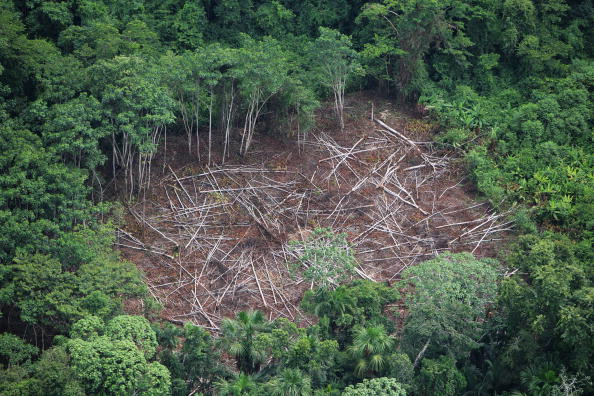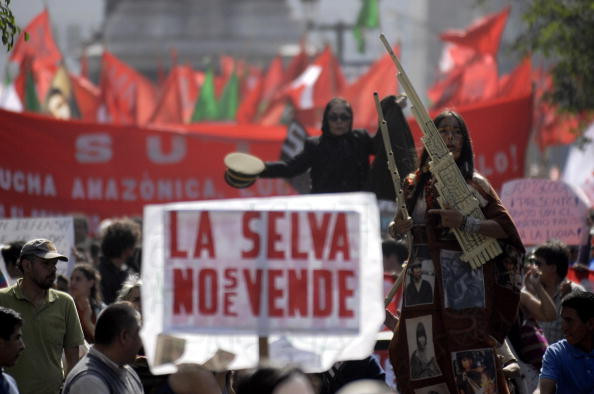Peru: Indigenous women can protect the Amazon forest - if only their rights are respected
A new report highlights that when women's tenure rights are not respected in community forests, the environment can suffer.
In the depths of the lush, dense tropical forest that covers vast swathes of Peru, indigenous women are fighting for their rights and for the fate of their lands.
For generations, the abundant tropical vegetation has provided them with shelter, and has been the privileged place they turned to for food and medicine.
But poor legal protection at a national level means women have often been unable to take meaningful decisions within their communities regarding the management and conservation of forests.
As climate change intensifies, coupled with the threat of logging and mining activities, Peru's indigenous women are losing valuable opportunities to protect the green areas that are so central to their livelihood - and to the future of the planet.
'The forest is our life'
Ketty Marcelo is the president of Onamiap, an organisation which advocates for changing legal frameworks that discriminate against indigenous women in Peru. She is a native from the Pucharini community, in the central selva – a region in the central highlands and westernmost Peruvian Amazon.
When her father died, Marcelo saw her mother struggle for two years to make sure her land tenure rights were respected by the rest of the community. This experience left a lasting impression on the young girl, prompting her to start advocating for the rights of indigenous women – including their rights to decide how the forested lands belonging to the community are managed and protected.
"For native indigenous communities and especially for us, the women, the forest is our life. All our livelihood is derived from its resources. When we want seeds or medicine, we collect them from the forest. We know when it's going to rain by looking at the leaves, what types of fish are in the river," Marcelo told IBTimes UK.
"This knowledge is inherited from our grandmothers and from our mothers. It's a unique knowledge that only us women possess and can transmit to future generations. But despite having the greatest responsibilities in managing community forests, we are not given the same powers as men when it comes to taking big decisions."

Although community law greatly dictates how much Marcelo and her peers can be involved in the management of community forests, the activist believes the national government also has a crucial role to play in consolidating the rights of indigenous women. So far, she says it is not doing enough to ensure women are able to perform their critical function as the protectors of the forested areas belonging to indigenous communities.
A recent report published by the Rights and Resources Initiative (RRI) backs up Marcelo's arguments.
Community forests are forests that are collectively held by indigenous people and communities, they are forests that are collectively owned.
RRI had already collected global datasets on where these forests are and on the legal recognition of indigenous communities' rights to forests.
Its authors investigated the extent to which the rights of women in community-based forests are recognised by national law, in 30 developing countries of Africa, Asia and Latin America (including Peru), and encompassing 78% of the developing world's forests. They examined constitutions and statutory laws related to forests, land, natural resources, and inheritance in these countries.
Only 17 of the countries were found to affirm women's property rights, and only eight appeared to mandate that daughters, widows and unmarried women in consensual unions have equal rights to inherit alongside their male counterparts.
"Governments have legal obligations to respect women tenure rights, and to pass law that respect and protect these rights, but we find that they have yet to do so. Community practices do play a dominant role and in certain cases assert the tenure rights of women in community forests. But these community norms do interact with statutory laws - no community exists in a bubble," said Stephanie Keene, one of the report's authors and tenure analyst for RRI.

"We need to start paying closer attention to national laws because they can completely overlook women and/or directly contradict gender-equality practice in some communities. We need national legal reforms to secure the forest rights of communities and of the women within those communities."
Promoting conservation
The report suggests that promoting the rights of women to forest land at a national level could do more for conservation than any other environmental law passed by governments. As such, it leads us to rethink the way laws that promote conservation of forest are designed.
The authors highlight that when a country's legal frameworks acknowledge communities as forest owners, they also tend to provide the greatest protections for women's rights. In contrast, frameworks established for conservation purposes—which seldom acknowledge communities as forest owners—offer the fewest and weakest protections for women.
Read more: Embark on a VR tour of the Amazon forest
In many indigenous groups, such as in Marcelo's community, women are the managers of community forests and their actions are crucial to preserve natural resources and the integrity of forested lands. By stewarding these lands, women play a fundamental role in food security and in the conservation of biodiversity - but these conservation efforts can easily be undermined by the absence of protections for women's rights.
In other words, conservation laws which ignore the rights of women may be counterproductive as they deprive women of the possibility to protect their lands from climate change, theft and exploitation.

"Women are powerful actors when it comes to fighting for community forests. We support a number of communities where women are on the frontline of battles against mining or other projects that threaten to destroy community forests. They take these active roles in part because they rely so much on forests for their family's livelihoods – but current legal frameworks do not make it easy for them," Keene said.
In their corner of the Amazon forest, Marcelo and her peers are making their voices heard at community levels and are trying to change the mentality of the men they share the land with. But until the state recognises their crucial role, there is only so much they can do.
"In our communities, we are trying to actively participate to decision-making and forest management. But our societies are still patriarchal and most of the time the state does not want to get involved so it's hard to break gender barriers and to assert our tenure rights," Marcelo said.
"Over the last few years we have seen great changes in the forest due to climate change. We now have to go further to look for seeds or to hunt and many rivers are all dried-up. We women have different projects to help protect the forest - including setting up protected areas that nobody will be able to touch - but it will be hard to succeed if national laws do not back us up."
© Copyright IBTimes 2025. All rights reserved.






















